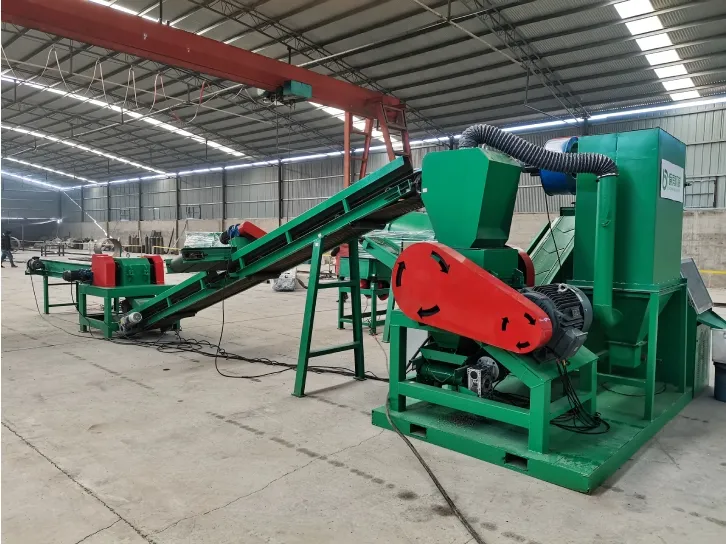

Oct . 11, 2024 00:35 Back to list
Eddy Current Non-Ferrous Metal Separator Enhancing Recycling Efficiency
In today's world, with increasing concerns over environmental sustainability and waste management, the recycling of metals has emerged as an essential practice across various industries. One of the key technologies that facilitate efficient recycling processes is the Eddy Current Non-Ferrous Metal Separator. This technologically advanced device plays a crucial role in recovering valuable non-ferrous metals like aluminum, copper, and zinc from other materials, thus contributing to a more sustainable future.
The Principle of Eddy Current Separation
Eddy current separation is based on the principle of electromagnetic induction. When non-ferrous metals are introduced into a magnetic field, electrical currents, known as eddy currents, are induced in the conductive metals. This phenomenon occurs because the magnetic field creates a force that repels the non-ferrous metals away from the rest of the material. The separator typically consists of a conveyor belt that transports mixed materials past a rotating magnetic drum. As the materials move through the magnetic field, the eddy currents generated in the non-ferrous metals experience a repulsive force, causing them to be separated from the remaining materials.
Advantages of Eddy Current Separators
Eddy current separators offer numerous advantages, making them a popular choice in recycling facilities and waste management systems. One of the primary benefits is their efficiency in recovering non-ferrous metals with high purity rates. The technology can separate metals with an accuracy of up to 99%, significantly reducing contamination with ferrous materials. This high level of separation is vital for industries looking to reuse metals without needing extensive reprocessing.
Additionally, eddy current separators are reasonably low maintenance since they have no moving parts in the magnetic system. This characteristic not only reduces wear and tear but also lowers the cost of the equipment in the long run. Moreover, they can process a wide variety of materials, including automotive shredder residue, electronic waste, and municipal solid waste, making them versatile tools in the recycling sector.
Applications in the Recycling Industry

The applications of eddy current non-ferrous metal separators are diverse, catering to various industries. In metal recycling facilities, they are commonly employed to recover non-ferrous metals from metals that generally contain a mix of materials, such as shredded cars, discarded appliances, and electronics. The accuracy of the separation process enhances the overall yield of recoverable materials, increasing profitability while decreasing the environmental impact of metal extraction and production.
In the electronics recycling sector, eddy current separators are particularly crucial. Electronic waste (e-waste) is a significant source of non-ferrous metals, and the separation process ensures that valuable components are salvaged efficiently, reducing the need for mining new metals. This not only conserves natural resources but also minimizes the ecological footprint associated with traditional metal extraction processes.
Challenges and Future Developments
Despite their advantages, eddy current separators face certain challenges. For instance, the presence of very small non-ferrous metal particles can hinder effective separation. Ongoing advancements in technology aim to address these challenges by enhancing the sensitivity and fine-tuning the magnetic fields to capture smaller particles.
Moreover, as the landscape of recycling continues to evolve with new materials and product designs, the development of more sophisticated non-ferrous metal separators will become increasingly necessary. Innovations in magnetic separation technology, along with advancements in automation and artificial intelligence, hold the potential to improve the efficiency and throughput of these systems even further.
Conclusion
Eddy current non-ferrous metal separators play a vital role in modern recycling operations, enabling the efficient recovery of valuable metals while promoting sustainable practices. As the global demand for recycled materials continues to rise alongside the need for sustainable waste management solutions, the importance of this technology will only grow. By investing in advanced recycling technologies, industries can not only enhance their operational efficiency but also contribute significantly to global sustainability efforts. Embracing the potential of eddy current separators is a step towards a cleaner, more sustainable planet.
Latest news
Troubleshooting Common Eddy Separator Problems
NewsJul.04,2025
The Role of Metal Recycling Plants in Circular Economy
NewsJul.04,2025
The Impact of Recycling Line Pickers on Waste Management Costs
NewsJul.04,2025
Safety Features Every Metal Shredder Should Have
NewsJul.04,2025
How Industrial Shredders Improve Waste Management Systems
NewsJul.04,2025
How Cable Granulators Contribute to Sustainable Recycling
NewsJul.04,2025